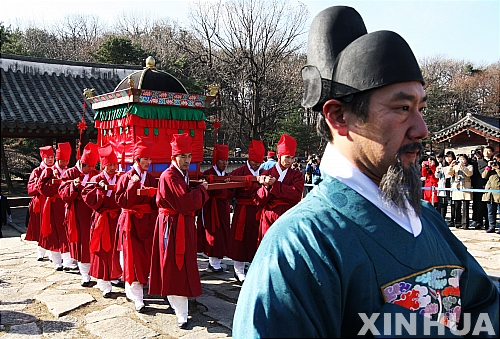
Disbanding the Korean Imperial Army
 Min Byung Don (ROK Reserve Army General) – On a rainy morning on August 1st 1907, Commander Yang Sung Hwan and his cavalry, artillery, and infantry officers of the Imperial Guards were summoned to the office of Hasegawa, the Japanese Imperial Army Commander. There, the Minister of the Military, Lee Byung Moo, read the Emperor’s edict. All members of the Korean Imperial Army were to gather at the training grounds by 10 AM to be disbanded.
Min Byung Don (ROK Reserve Army General) – On a rainy morning on August 1st 1907, Commander Yang Sung Hwan and his cavalry, artillery, and infantry officers of the Imperial Guards were summoned to the office of Hasegawa, the Japanese Imperial Army Commander. There, the Minister of the Military, Lee Byung Moo, read the Emperor’s edict. All members of the Korean Imperial Army were to gather at the training grounds by 10 AM to be disbanded.
Commander Yang and his officers were shocked and angry, but the Japanese Army had expected their reactions and had them surrounded and under surveillance. The officers returned to their barracks and instructed their men to “gather at the training grounds, unarmed, for calisthenics.” The men gathered as ordered.
The Vice Minister of the Military, Han Jin Chang, appeared with officers from the Japanese Imperial Army and passed down the edict of disbandment. As severance pay, they paid Non-Commissioned Officers eighty Wons, and the foot soldiers fifty or twenty-five Wons based on seniority. As the soldiers lined up for the “grace pay,” their helmets, badges, and bayonets were taken away. While this was going on, a private came running to share the news that the company commander had killed himself.
Major Park Seung Hwan commanded the First Company of the First Infantry Brigade. Major Park had not attended Hasegawa’s summons because he was feeling ill. When he heard the news that his company was being disbanded, as was the entire Korean Imperial Army, he shot himself with his revolver out of anger and despair. His men, having learned of Major Park’s death, ripped up the “grace pay” of the Japanese Empire, raided the armory, and fought off the Japanese army which surrounded them. The Second Company of the nearby Second Infantry Brigade joined in the firefight against the Japanese near the South Gates of Old Seoul. Completely outnumbered, the fight ended with over two hundred dead Korean soldiers and over a hundred dead Japanese soldiers.
Technically, the disbandment of the Royal Guards and the Korean Imperial Army was by edict of the Emperor Sunjong, but most people knew that the Japanese Empire had engineered the disbandment as well as the abdication of Sunjong’s father and former Emperor, Gojong. The disbanded Royal Guards became guerilla fighters and worked with local militias to organize a national revolt against Japanese imperialists.
These guerillas were very different from the guerillas that fought against the Imjin Japanese invasions during the 16th century. In the Imjin years, guerillas were often led by Confucian scholars who were gung-ho in spirit but uninspired in actual combat. Many of the new revolutionary fighters had the benefit of official training and were high in both morale and combat experience. They fought the Japanese imperialists in Korea before escaping to Manchuria to continue their resistance to the Japanese Empire. We gladly commemorate and celebrate their patriotism and independent spirits to this day.


